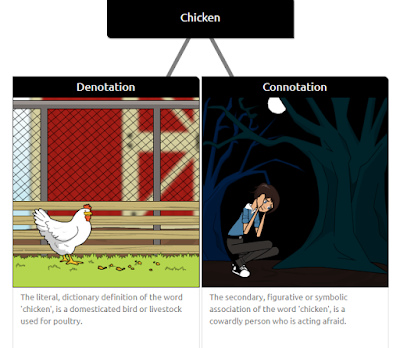Goals: Understanding connotation and denotation and then applying that knowledge to some excerpts from the story we read yesterday.
Agenda:
Read
Connotation and Denotation Lesson
Application with a partner.
Connotation and Denotation Lesson:
DICTION refers to the specific word choices that authors make.
Often, authors choose specific words because of their CONNOTATION.
Words can be interpreted three different ways.
1. DENOTATION - This is the literal, dictionary definition of a word.
2. CONNOTATION (emotional charge) - Every word has a positive, neutral, or negative connotation or association.
With your partner:
Complete THIS GOOGLE FORM to look more closely at some of the language from the story we read yesterday. (It's okay if you didn't finish reading it. There are paragraphs on the form of the parts you really need.)
Absent? You are still responsible for the work. You can do it on your own.
Agenda:
Read
Connotation and Denotation Lesson
Application with a partner.
Connotation and Denotation Lesson:
DICTION refers to the specific word choices that authors make.
Often, authors choose specific words because of their CONNOTATION.
Words can be interpreted three different ways.
1. DENOTATION - This is the literal, dictionary definition of a word.
2. CONNOTATION (emotional charge) - Every word has a positive, neutral, or negative connotation or association.
- "Youth" = positive connotation (or association); "Juvenile" = negative connotation; "Adolescent" = neutral connotation.
- "Request" or "Remind" = positive connotation; "Whine" or "Nag" = negative connotation; "Ask" = neutral connotation.
- "Assertive" = positive; "Bossy" = negative; "Dominant" = neutral.
3. CONNOTATION (symbolic meaning) - Some words have a secondary figurative or cultural association with them. In this case, the word can take on a whole new meaning.
- Snake: An evil, devious or immoral person.
- Chicken: A coward.
- Pig: A vulgar person or slob.
- Sweet: Cool, awesome or fun.
With your partner:
Complete THIS GOOGLE FORM to look more closely at some of the language from the story we read yesterday. (It's okay if you didn't finish reading it. There are paragraphs on the form of the parts you really need.)
Absent? You are still responsible for the work. You can do it on your own.
Reminders:
- Did you finish all the work in your English Journal? Are you sure? (Especially your theme paragraph and your characterization paragraph, and your most recent article of the week?)
- Did you finish reading (questions) for A Very Old Man With Enormous Wings.
- Finish reading your group novel by Wednesday 10/30.



Comments
Post a Comment